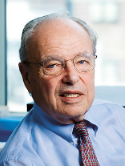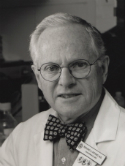Induced differentiation, the cell cycle, and the treatment of cancer Journal Article
| Authors: | Rifkind, R. A.; Richon, V. M.; Marks, P. A. |
| Article Title: | Induced differentiation, the cell cycle, and the treatment of cancer |
| Abstract: | Hybrid polar compounds, of which hexamethylene bisacetamide (HMBA) is the prototype, have been shown to be potent inducers of differentiation of many types of transformed cells, With virus transformed murine erythroleukemia cells as a model, HMBA was shown to cause these cells to arrest in G(1) phase and express globin genes. HMBA action involves modulation of factors regulating G(1) to S phase progression, including a decrease in the G(1) cyclin-dependent kinase 4 accumulation of underphosphorylated retinoblastoma protein, and an increase in the level of both retinoblastoma protein and the related protein, p107. In turn, p107 complexes with transcription factors such as E2F and, presumably, inhibits transcriptional activity of these factors for genes whose products are required for DNA synthesis. This provides a possible mechanism for HMBA induced terminal cell division of transformed cells. Evidence that hybrid polar compounds have therapeutic potential for cancer treatment is also reviewed. |
| Keywords: | chemotherapy; cell cycle; retinoblastoma protein; differentiation; gene-expression; tgf-beta; phase-i; c-myb; protein-kinase; erythroid differentiation; erythroleukemia; hexamethylene bisacetamide; dimethyl-sulfoxide; cancer; murine erythroleukemia-cells |
| Journal Title: | Pharmacology & Therapeutics |
| Volume: | 69 |
| Issue: | 2 |
| ISSN: | 0163-7258 |
| Publisher: | Elsevier Inc. |
| Date Published: | 1996-01-01 |
| Start Page: | 97 |
| End Page: | 102 |
| Language: | English |
| ACCESSION: | WOS:A1996UD05300002 |
| DOI: | 10.1016/0163-7258(95)02044-6 |
| PROVIDER: | wos |
| PUBMED: | 8984510 |
| Notes: | Review -- Source: Wos |
Altmetric
Citation Impact
BMJ Impact Analytics
Related MSK Work





